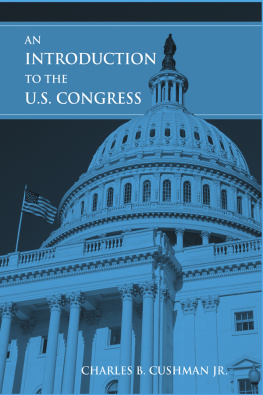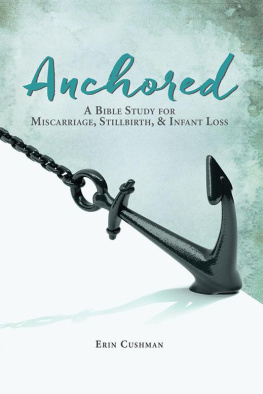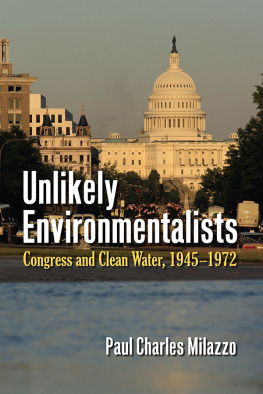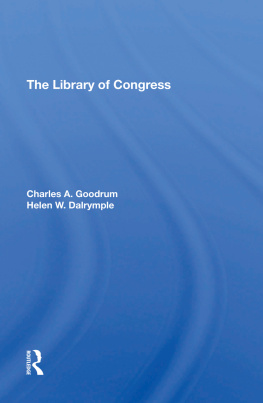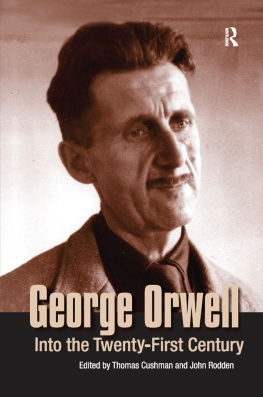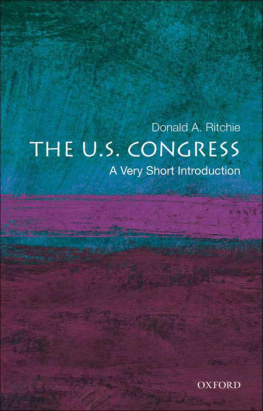AN
INTRODUCTION
TO THE
U.S. CONGRESS
AN
INTRODUCTION
TO THE
U.S. CONGRESS
CHARLES B. CUSHMAN JR.
First published 2006 by M.E. Sharpe
Published 2015 by Routledge
2 Park Square, Milton Park, Abingdon, Oxon OX14 4RN
711 Third Avenue, New York, NY 10017, USA
Routledge is an imprint of the Taylor & Francis Group, an informa business
Copyright 2006 Taylor & Francis. All rights reserved.
No part of this book may be reprinted or reproduced or utilised in any form or by any electronic, mechanical, or other means, now known or hereafter invented, including photocopying and recording, or in any information storage or retrieval system, without permission in writing from the publishers.
Notices
No responsibility is assumed by the publisher for any injury and/or damage to persons or property as a matter of products liability, negligence or otherwise, or from any use of operation of any methods, products, instructions oride as contained in the material herein.
Practitioners and researchers must always rely on their own experience and knowledge in evaluating and using any information, methods, compounds, or experiments described herein. In using such information or methods they should be mindful of their own safety and the safety of others, including parties for whom they have a professional responsibility.
Product or corporate names may be trademarks or registered trademarks, and are used only for identification and explanation without intent to infringe.
Library of Congress Cataloging-in-Publication Data
Cushman, Charles Bancroft.
An introduction to the U.S. Congress / Charles Bancroft Cushman, Jr.
p. cm.
Includes bibliographical references and index.
ISBN 0-7656-1506-1 (cloth : alk. paper) ISBN 0-7656-1507-X (pbk.: alk. paper)
1. United States. Congress. I. Title.
JK1021.C87 2006
328.73dc22
2005025785
ISBN 13: 9780765615077 (pbk)
ISBN 13: 9780765615060 (hbk)
For Tommie W. Bates
O Godgive him back, give him back to us!
Please give us back our Owen Meany
John Irving, A Prayer for Owen Meany
Contents
An amazing array of wonderful people helped me figure out what I wanted to say about Congress and how to say it in a logical way. Five groups stand out.
First, several former employers got me started on the quest to understand Congress. At the U.S. Military Academy, Col. Jay Parker of the Department of Social Sciences and Brig. Gen. Daniel Kaufman, dean of the Academic Board, were instrumental in getting me to graduate school to prepare for a teaching assignment at West Point. They steered me to American politics and supported me as I worked on my dissertation. My professors at the University of North Carolina at Chapel Hill excited me about the complexities of congressional politics. Terry Sullivan is a giant for his support and guidance as my adviser. Deil Wright, David Lowery, Eric Mlyn, and Steve Leonard all taught me well. Rep. David Price, of North Carolinas Fourth Congressional District, was a wonderful boss and a tremendous public servant; his wisdom helped me make full use of the inside knowledge I got as one of his legislative assistants in the 105th Congress. Billy Moore, Jean-Louise Beard, Darek Newby, and Mark Harkins of his staff added immensely to the joy of life on the Hill.
Second, my fellows at the Graduate School of Political Management at The George Washington University put up with incessant ramblings about this project for fifteen months. Their good humor, and good advice, made this a much better book. Special thanks to our dean, Chris Arterton, for his support and steady hand at the helm of our school, and to Dennis Johnson, Steve Billet, Rick Virgin, Todd Berkoff, Melissa Dormer, and David Marshall for their advice and enthusiasm in discussing sections of the book with me.
Third, I owe special thanks to the Government Affairs Institute at Georgetown University. Since 2001 I have been lecturing in their Congressional Operations Seminars, and that series of talks evolved into this book. Thanks to Ken Gold, John Haskell, Susan Lagon, Worth Hester, Howard Stevens, Jim Hershman, and Valerie Heitshusen for their feedback.
Fourth, I cannot calculate how much I have learned from my students in the masters program in legislative affairs since my start at The George Washington University in 1998. I love their enthusiasm for graduate school, especially since most of them are full-time working professionals.
Finally, my friends and family have put up with obsessive research and writing for a long time. My parents have been great in pushing me to get this written. Steven Stichter earned much treasure in heaven for his careful and most excellent editing of early drafts of much of the book; his hand greatly improved what follows. My partner Christopher Gregg is a prince for enduring all the late nights of writing, mad discussions of seventeenth-century English politics, and bizarre arcana of committee jurisdictions. Thanks for being amazing!
Plaudits to the crack staff at M.E. Sharpe for their work. Editor Niels Aaboe was Job-like in his strength and patience with a first-time author, and his assistant, Amanda Allensworth, was great. Thanks to Laurie Lieb for her great copyediting. Thanks also to editorial director Patricia Kolb and project editor Henrietta Toth for launching this book. You rock! Thanks also to the anonymous reviewers, whose questions and advice sharpened the argument I present here.
I cannot express my thanks strongly enough to all of these great folks. Their support made this project possible, and they made it better. The good stuff here is due to their help; I am solely responsible for any errors or confusion that remains.
AN
INTRODUCTION
TO THE
U.S. CONGRESS
In republican government, the legislative authority necessarily predominates. The remedy for this inconveniency is to divide the legislature into different branches; and to render them, by different modes of election and different principles of action, as little connected with each other as the nature of their common functions and their common dependence on the society will admit.
Federalist No. 51
Why is Congress such a complicated institution? What does Congress do, and how does it do it? Will it be able to meet the policy challenges of the next few decades?
Ever since beginning my study of Congress in 1992 at the University of North Carolina at Chapel Hill, I have been trying to figure out good answers to those three questions. After my graduate studies, during which I examined the role of congressional leaders in setting defense policy, I went to work in professional politics for several years, a sort of practical postdoctoral fellowship in real-world congressional politics. I worked on a congressional campaign during the 1996 election and spent two years working for Rep. David Price (D-NC) as a legislative assistant, working on a variety of issues in the fast-paced environment of a Capitol Hill officestill seeking answers to those three questions. The campaign and the staff work made the central importance of serving constituents come alive for me and helped me to see the powers and limitations of political science as a means of explaining our complicated political system in the United States. Following my time on the Hill, I worked as a lobbyist and as a consultant in Washington for several years and saw firsthand how Congress sits at the center of the decision-making network. Congress is the mechanism that connects politics and policy in Washington, DC, and Congress provides the forum for discussing all the important issues in the national government. Since 2001 I have been working on understanding how Congress brings policy and politics together at The George Washington Universitys Graduate School of Political Management, teaching about Congress and continuing my research on the legislatures role in national politics.


